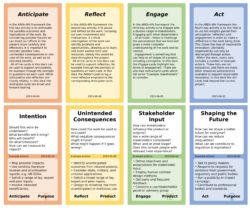10
07
.23
A final word from hoRRIzon 2.0
A key area of hoRRIzon 1.0 and this second iteration of work has been to introduce a cross cutting theme, offering researchers support to embed a responsible research approach into their own projects. To a significant extent, we have been successful in helping colleagues within both our own programme and the Trustworthy Autonomous System (TAS) Hub, to value responsible research and innovation (RRI). The multidisciplinary nature of both programmes has also led to an interest from a broader network of researchers, keen to support a responsible digital future. To encourage this, we have set up a research network and website to support scholars interested in exploring how current and future digital technologies can be designed, developed, used and retired in ways that are acceptable, desirable and sustainable.
Our work has identified the complexity and importance of RRI. We have facilitated regular RRI sessions with research project teams, for example with Memory Machine (MeMa 3.0) and Everything in Moderation projects, to provide them with protected time to identify issues and risks, to reflect, discuss and then plan actions to address these. These sessions have encouraged a great deal of productive discussion, encouraging teams to focus on important questions such as:
- What assumptions are being brought into the research and are these assumptions valid?
- What are the potential unintended impacts of the planned project outcomes, and how might any negative impacts be avoided or mitigated and
- What steps are the project team taking to be responsible in their own practices and ongoing activities?
In our previous blog we talked about our work developing a set of RRI Prompt and Practice cards’ and described some of the events we attended to test them among a variety of audiences. We have continued to test and refine these cards as described in a short paper to be presented at the TAS Hub Symposium and have now created a second public version of the RI cards’ (officially version 3.1). Learning from the facilitated sessions we ran, this version of the cards has been designed to be easier to use “out of the box”, for example without a facilitator being present. The cards include brief explanations of responsible innovation, the AREA-4Ps framework and three initial activities to try. We are currently evaluating the latest version of the RI cards (version 3.1) with research groups from Horizon and TAS.

Researchers from Horizon and TAS have also been engaging with external audiences to deliver events on RRI-related topics including technology for animals, and sustainability. In December Alan Chamberlain led a workshop with the TAS Cat Royale project (with artists Blast Theory), which included exploring responsible innovation issues in technology design with and for non-human animals.

In May, we worked with artists and creators including Rachel Jacobs, Makers of Imaginary Worlds, Richard Ramchurn and Ali Houssaini, to explore together issues of responsibility and sustainability in the emerging world of Artificial Intelligence (AI) . Some of the findings and ways of understanding Responsible Innovation were used in a further workshop, hosted by the University of Oxford, which brought people together from the Arts, Technology and Humanities.
This July, researchers from hoRRIzon 2.0 will be attending the TAS Hub Symposium – taking place at the National Robotarium in Edinburgh – to present an overview of RRI activity to date. The symposium also presents a fantastic opportunity to launch the latest version the Responsible Innovation (RI) prompts and practice cards, exploring the opportunities and challenges of responsible research and innovation with delegates.
So, what comes next? In addition to writing up our work, we are preparing impact funding proposals to bring together learnings from the experiences of responsible innovation across Horizon and the TAS hub network – and beyond. We are also developing supporting resources, including the TAS Hub RRI mini-site and promoting best practices arising from this to the wider Information and Communication Technologies (ICT) research community.
Tags:
AREA-4Ps,
Blast Theory,
digital technologies,
everything in moderation,
Makers of Imaginary Worlds,
MeMa 3.0,
Memory Machine,
National Robotarium,
responsible research,
responsible research and innovation,
RRI,
TAS hub,
Trustworthy Autonomous Systems















